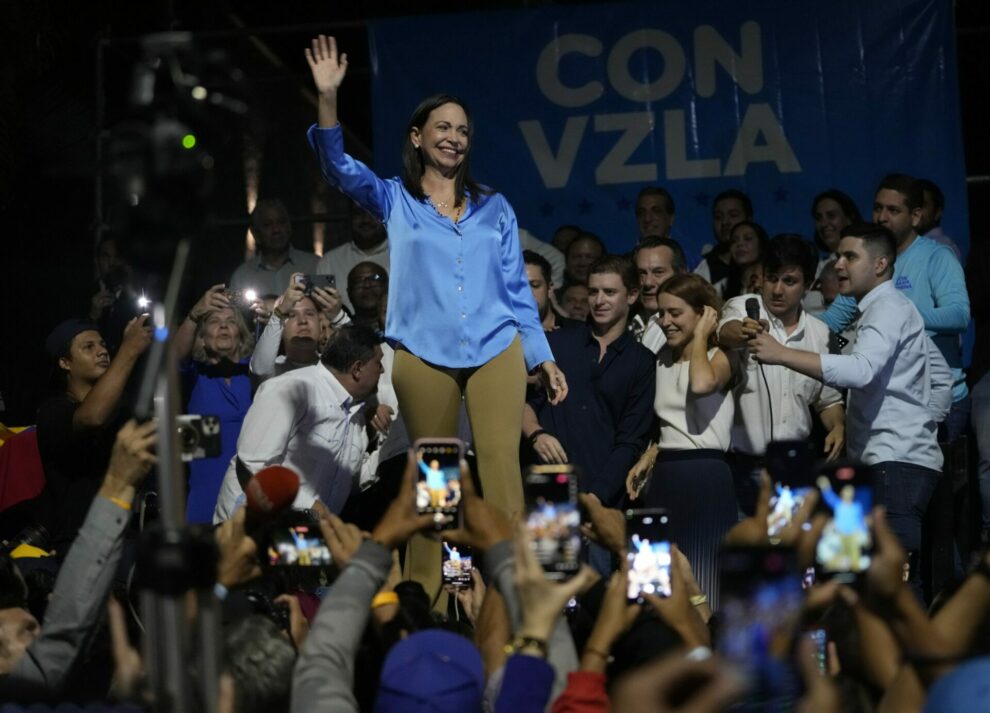María Corina Machado – a conservative, free market candidate who has spoken out harshly against the regime of Venezuelan President Nicolás Maduro – handily won Venezuela’s first opposition presidential primary election in over a decade last weekend. Free and fair elections were a key stipulation of an agreement reached by the United States and Venezuela last week that calls on the former to roll back sanctions on several Venezuelan industries, including its oil and gas sectors. The elections nonetheless faced heavy obstacles from pro-government forces: Venezuela’s telecommunications agency shut down an online polling place locator and some Maduro supporters reportedly threatened to set fire to voters’ cars, to say nothing of logistical setbacks like long lines, poll relocations, and delayed vote tallies.
The true test of whether this will herald substantial improvements in the frigid U.S.-Venezuela relationship, however, will be whether Machado is allowed to run against Maduro in a 2024 general election. Over the summer, the Venezuelan government barred Machado from holding office for 15 years, due in part to her support for U.S. sanctions and the former opposition leader Juan Guaido. Machado’s insistence that she would hold members of the Maduro regime – which is being investigated for possible crimes against humanity by the International Criminal Court – responsible for alleged human rights abuses, including arbitrary detention, torture, and sexual violence, will also surely complicate the regime’s willingness to allow her to take power. During a recent interview, the U.S. National Security Council’s top Latin America expert, Juan Gonzalez, said the United States should be prepared to abandon its agreement with Venezuela if does not see clear signs by November that the government is holding its end of the bargain, including holding free and fair elections as well as releasing political prisoners. In such an event, Gonzalez called for implementing more precise sanctions, rather than reinstating the sector-wide sanctions originally put in place against Venezuelan energy, gold, and finance. Such a decision would require input from the U.S. Congress as well as Venezuelan stakeholders, he said.
The U.S.-Venezuela deal builds off of a broader campaign by the Biden administration to relieve tensions with Venezuela, a country whose economic woes have only been compounded by extreme sanctions pressure enacted under the administration of former U.S. President Donald Trump. With its vast oil reserves cut off from legal international markets, Venezuela has been forced to sell its oil at up to a 40 percent discount, according to The Economist. Since the deal was announced, Bloomberg reported that Venezuela is on track to increase its oil production by nearly 25 percent. Last November, the U.S. Treasury granted Chevron a six-month license to expand its Venezuelan operations and import Venezuelan oil to the United States.
The effectiveness of U.S. sanctions targeting unfriendly dictatorial regimes, particularly as a tool to promote regime change, has been a subject of dispute in recent years. While catalyzing regime change is not necessarily the goal of all sanctions policies, such an outcome has certainly factored into U.S. policies towards Venezuela, Iran, Russia, North Korea, and even Iraq under Saddam Hussein in the past. Meanwhile, sanctions that are not narrowly targeted to individuals or organizations can cause broader harm to civilian populations by stunting economic potential and at times denying access to international humanitarian aid, which often contributes to increased migration and displacement. At the same time, some of these sanctioned states have strengthened relations with one other in a show of solidarity amid U.S. attempts to isolate them from the international community. Last summer, Maduro visited Iran, where he struck a 20-year cooperation agreement with Iran while Venezuela was provided with a fuel shipping tanker. Since Israel launched its war against Hamas earlier this month, Maduro has reached out to the president of the Palestinian Authority – a political competitor to Hamas that governs the West Bank – pledged to provide the Palestinians with humanitarian aid, and has reviewed Chinese and Egyptian initiatives for a peace conference concerning the fighting in Gaza.
The legal troubles of one influential U.S. lawmaker may have given the United States some space to pull back on its aggressive posturing towards Venezuela. U.S. Senator Robert Menendez (D-NJ), a veteran of the Senate Foreign Relations Committee, has been indicted by the U.S. Department of Justice on multiple criminal charges and stands accused of acting as an unregistered agent of the Egyptian government. Having previously opposed reversing sanctions on Venezuela, Menendez’s resignation from his committee leadership post may have opened the door for the Biden administration to advance efforts to relax tensions with Venezuela. While softening the blow of sanctions could help Venezuela recover from its dire humanitarian crisis, the U.S. government also has its own motivations for bringing Venezuela back into the global community. Global energy prices and migration, for instance, are two major concerns for both the American public and Biden’s 2024 re-election campaign. With polls placing Biden neck-and-neck with Donald Trump, releasing Venezuela’s vast oil back into the international marketplace could help offset price spikes resulting from Western sanctions on Russian energy exports as well as OPEC+ energy production cuts. Additionally, amid a mass exodus of Venezuelans from their home country due to the economic and political turmoil, Venezuelan nationals now account for more U.S. border encounters than any other nation other than Mexico, according to U.S. Customers and Border Protection.
Since Donald Trump made immigration and refugees central to his 2016 presidential campaign, the issue has become more salient on the American left, as well. Even political leaders in Democratic Party strongholds – including New York Governor Kathy Hochul and New York City Mayor Eric Adams – have begun to speak out against the Biden administration over its migration and border policies, while insisting that the federal government provide more support to counter the economic cost of hosting historic inflows of migrants. 40 percent of the asylum seekers New York City has received over the last year come from Venezuela, according to the city’s own estimates. Last week, the Biden administration re-initiated direct deportations of undocumented migrants to Venezuela, and last month, it offered temporary legal status to approximately 472 thousand Venezuelan migrants who had arrived in the United States since July 31.
Source: The Soufan Center















